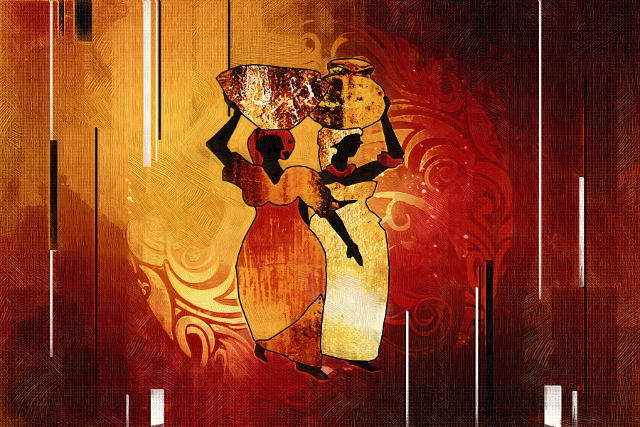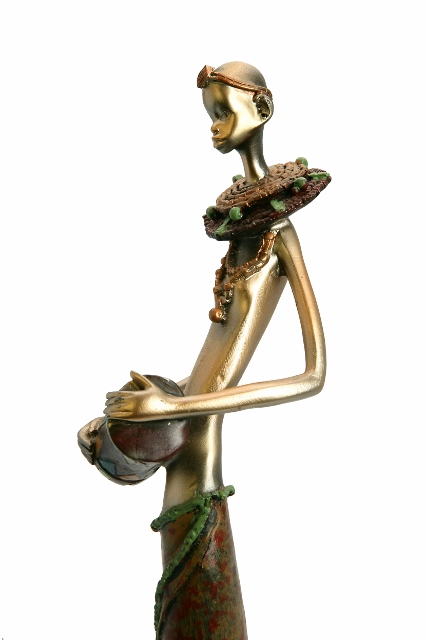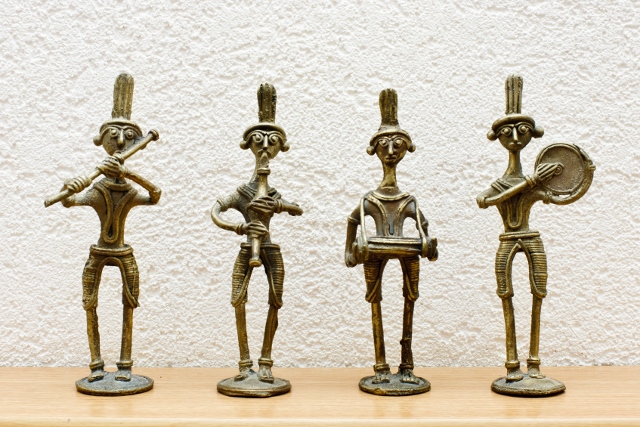The Nubic Kingdoms of Jarra
“If you want to travel fast, take the journey by yourself. If you want to travel far, take the journey with your people”
– Nubic proverb
The Nubic, or Hill Kingdoms lie in the southern edge of the center of the continent of Jarra, forming a ‘belt’ of five realms that stretch from the Ijon River in the east to Lake Kongo in the west (Samucha, Chide, Morore, Bocha and Falancha). The kingdoms are bordered to the north by highland rainforest, and to the south by dry savanna and miombo woodland. As such, they encompass several biomes, including riparian forest in the west and savanna and woodland in the south and east.
Trade is the most important industry in the Kingdoms, as they economically bind neighboring polities and serve as a conduit to commerce between the coast and the interior of the continent. Linen and cotton cloth are the most essential goods imported from the coast; iron and precious metals from the south; hides, feathers and furs from the north; and fine ironwork and Shangan gold from the Lake Kongo region.
To facilitate trade, the Kingdoms boast two marvels of transportation. The Brassbelt Road runs from the Ijon River west through each kingdom’s capital to the border of the easternmost kingdom of Falancha. In heavily wooded Falancha, where roads are more difficult to maintain, the Hibiscus Canal completes the artery, emptying into the inland sea of Lake Kongo.
While they excel at trading, the Nubic people produce many of their own goods. Food staples are yam in the west and millet and sorghum in the east. Kichi, a smoked fish from Lake Kongo, is popular throughout the Kingdoms. These realms are famous for the production of hibiscus oil and marula wine, and the brasswork of the powerful Casting Guilds. The smiths of Lake Kongo are also known for their fine ironwork that produces hooks and needles for fishing and sailcraft. Copper mines, especially in Bocha, Morore and Chide, produce enough of the metal for internal needs and export.
Politically, the Nubic Kingdoms are infamous for competing factions and instability. Seven Clans claim royal heritage, dating back to the Age of the Clover Princes, when the Kingdoms were unified under a single noble family that intermarried with each clan. Clan membership extends across borders, with none of the royal clans contained within a single Kingdom. Each has thousands of members. The fractiousness of the Kingdoms is exacerbated by powerful external forces. To the south, the Sizwe Empire exerts a weighty influence over the Kingdoms, dating back two decades to the Impi War and the Battle of Bandiri Slopes. To the east, the Ikanje State sees the Kingdoms primarily as a buffer against Sizwe expansion. To the west, across Lake Kongo, the growing power of the Kwi-Kong Queendom gives rise to Nubic strategies of both defense and collaboration.
By contrast to their vicious politics, culturally the Kingdoms are relatively unified. Nubic is the universal common tongue, with the pidgin dialect of Trade Kan also being spoken in the central and eastern Kingdoms. The Kingdoms share similar laws, including laws of succession. Climate and terrain underlies some variations between the forested, wetter eastern kingdoms (especially Falancha) and the dryer, lightly wooded or savannah kingdoms to the west. This is true in particular with fashion and commonly eaten food. For example, affluent women in the west might wear elaborate hairstyles, while those in the east might opt for a wide-brimmed hat to ward off the sun. The Brassbelt Road and the Canal greatly add to the sense of shared culture in the Kingdoms. During the last week of Great Harvest, the Bursting Belt Festival is held throughout the Kingdoms – enjoyed in particular by merchants and travelers along that artery. Even though Clan conflict periodically manifests as open warfare and murder, the approximately one half million inhabitants of the Kingdoms consider themselves as a single ethnic group with shared institutions and history.
The Nubic Kingdoms – An Introduction
As excerpted from “My Years on the Brassbelt”, the manuscript of Nuru Mwangi, scribe and Golden Magister of Namu, 3122.The Nubic, or Hill Kingdoms lie in the southern edge of the center of the continent of Jarra, forming a ‘belt’ of five realms that stretch from the Ijon River in the east to Lake Kongo in the west (Samucha, Chide, Morore, Bocha and Falancha). The kingdoms are bordered to the north by highland rainforest, and to the south by dry savanna and miombo woodland. As such, they encompass several biomes, including riparian forest in the west and savanna and woodland in the south and east.
Industry
Trade is the most important industry in the Kingdoms, as they economically bind neighboring polities and serve as a conduit to commerce between the coast and the interior of the continent. Linen and cotton cloth are the most essential goods imported from the coast; iron and precious metals from the south; hides, feathers and furs from the north; and fine ironwork and Shangan gold from the Lake Kongo region.
To facilitate trade, the Kingdoms boast two marvels of transportation. The Brassbelt Road runs from the Ijon River west through each kingdom’s capital to the border of the easternmost kingdom of Falancha. In heavily wooded Falancha, where roads are more difficult to maintain, the Hibiscus Canal completes the artery, emptying into the inland sea of Lake Kongo.
While they excel at trading, the Nubic people produce many of their own goods. Food staples are yam in the west and millet and sorghum in the east. Kichi, a smoked fish from Lake Kongo, is popular throughout the Kingdoms. These realms are famous for the production of hibiscus oil and marula wine, and the brasswork of the powerful Casting Guilds. The smiths of Lake Kongo are also known for their fine ironwork that produces hooks and needles for fishing and sailcraft. Copper mines, especially in Bocha, Morore and Chide, produce enough of the metal for internal needs and export.
Politics
Politically, the Nubic Kingdoms are infamous for competing factions and instability. Seven Clans claim royal heritage, dating back to the Age of the Clover Princes, when the Kingdoms were unified under a single noble family that intermarried with each clan. Clan membership extends across borders, with none of the royal clans contained within a single Kingdom. Each has thousands of members. The fractiousness of the Kingdoms is exacerbated by powerful external forces. To the south, the Sizwe Empire exerts a weighty influence over the Kingdoms, dating back two decades to the Impi War and the Battle of Bandiri Slopes. To the east, the Ikanje State sees the Kingdoms primarily as a buffer against Sizwe expansion. To the west, across Lake Kongo, the growing power of the Kwi-Kong Queendom gives rise to Nubic strategies of both defense and collaboration.
Culture
By contrast to their vicious politics, culturally the Kingdoms are relatively unified. Nubic is the universal common tongue, with the pidgin dialect of Trade Kan also being spoken in the central and eastern Kingdoms. The Kingdoms share similar laws, including laws of succession. Climate and terrain underlies some variations between the forested, wetter eastern kingdoms (especially Falancha) and the dryer, lightly wooded or savannah kingdoms to the west. This is true in particular with fashion and commonly eaten food. For example, affluent women in the west might wear elaborate hairstyles, while those in the east might opt for a wide-brimmed hat to ward off the sun. The Brassbelt Road and the Canal greatly add to the sense of shared culture in the Kingdoms. During the last week of Great Harvest, the Bursting Belt Festival is held throughout the Kingdoms – enjoyed in particular by merchants and travelers along that artery. Even though Clan conflict periodically manifests as open warfare and murder, the approximately one half million inhabitants of the Kingdoms consider themselves as a single ethnic group with shared institutions and history.
Remove these ads. Join the Worldbuilders Guild






Comments